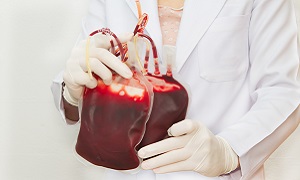Best Non-Hodgkin’s Lymphoma (NHL) Doctors in India
Here are the most reputed Haematologists and Medical Oncologists in India for the treatment of Non Hodgkin’s Lymphoma.
Best Non-Hodgkin's Lymphoma Hospitals in India
Hospital Highlights:
- Apollo Hospitals is a private healthcare group in India, with its headquarters based in Chennai. Established in 1983 by Dr. Prathap C. Reddy, the group offers a wide range of medical treatments and services across various specialties.
- It is renowned for emphasizing innovation and utilizing cutting-edge medical technologies into patient treatment.
- Known as India’s first corporate hospital, Apollo Hospitals is often credited for pioneering the private healthcare revolution in the country.
- With clinics and hospitals located all throughout India, Apollo Hospitals is a nationwide healthcare organization. Its presence can also be found in foreign countries.
- Preventive health examinations, medical and surgical treatment, and diagnostic centres are just a few of the services that the Apollo group provides.
- The group has several centres of expertise, including Cardiac Sciences, Neurosciences, Orthopedics, Emergency Care, Cancer Care, and Organ Transplantation.
- City: Chennai, India
Hospital Highlights:
- RIMC is a multi-specialty hospital in a sprawling area of 36 acres located in Chromepet, Chennai, Tamil Nadu, India.
- The facility has 450 beds including 130 critical care beds, 9 operating rooms, modern reference laboratories and radiology services, and is conveniently located near road, rail and air transportation.
- RIMC is led and managed by world-renowned physicians committed to healthcare.
- RIMC offers the broadest range of clinical care, education, and research. The hospital offers state-of-the-art technology and modern treatment facilities designed to provide health care at an affordable cost.
- Rela Institute is driven by patient needs, comfort and confidence.
- City: New Delhi, India
Hospital Highlights:
- Fortis Hospital in Shalimar Bagh is a multi-super specialty hospital that strives to provide world-class patient care by leaving no stone unturned.
- Fortis, Shalimar Bagh, with 262 beds and a 7.34-acre footprint, provides the best level of medical care through its team of doctors, nurses, technicians, and management professionals.
- City: Bengaluru, India
Hospital Highlights:
- Established in 2007, the Apollo Hospitals Bangalore is a 300-bed multispecialty hospital situated in Bannerghatta Road, Bangalore.
- Equipped with the state-of-the-art technology, it is a leading hospital dedicated to providing healthcare needs to patients with compassion and expertise.
- It is the first hospital to have completed the highest number of Robot Assisted Heart Surgeries in India.
- Over the years, it has successfully conducted some of the rarest medical procedures such as spinal angiolipoma excision, autologous chondrocyte implantations, and tibial tuberosity shift with MPSL reconstruction.
- The Apollo Hospitals Bangalore has the reputation of performing the greatest series of airway stents in the country.
- Additionally, the hospital is known for providing comprehensive treatment in specialties such as gastroenterology, urology, gynecology, oncology, colorectal surgery, etc.
- The “The Minimal Access Surgery Centre” (MASC), one of Apollo Hospitals, Bangalore’s premier Centres of Excellence, is devoted to the use of minimally invasive surgical procedures.
- In 2013, THE WEEK-A C Nielsen, Best Hospital Survey ranked Apollo Hospitals Bangalore as the 2nd best multi-speciality hospital in Bangalore.
- City: Mumbai, India
Hospital Highlights:
- Gleneagles Global Hospital The 450-bed facility comprises of 17-stories, housing state-of-the-art infrastructure, and advanced medical care facilities.
- The hospital offers end-to-end clinical, surgical, and diagnostic services. It is equipped with a team of eminent medical professionals aided by qualified nurses and medical staff
- The Hospital offers advanced Endoscopic procedures, Hepatobiliary and Liver Surgeries, Surgical and Medical Gastroenterology, Bariatric Surgery, and Robotic surgery.
- The hospital is a center of excellence for Orthopedics, Joint Replacement, Knee Replacement, and Hip Replacement surgery.
- City: Hyderabad, India
Hospital Highlights:
- CARE Hospitals were established in the year 2000, by CARE Group.
- The multispecialty hospital has 435 beds, including 120 critical care beds, with an annual inflow of 180000 outpatients and 16,000 in-patients.
- The hospital provides specialty medical services in Cardiology, Cardiothoracic Surgery, Pediatric Cardiology, Pediatric Cardiothoracic Surgery, Neurology, Neurosurgery, Nephrology, and Urology.
- The hospital has the first dual source, 128 slice CT scanner (for high precision cardiac imaging) – the first of its kind in south India.
- The hospital offers a wide range of accommodation facilities for the convenience of its varied patient base, ranging from general wards to super deluxe rooms.
- City: Mumbai, India
Hospital Highlights:
- Fortis Hospital in Mulund is a 315-bed multi-speciality tertiary care hospital with five JCI accreditations that offers a wide variety of diagnostic and treatment services. The Fortis Hospital in Mulund delivers patient-centred treatment with cutting-edge technology, highly skilled and experienced surgeons, and paramedical staff.
- This institution houses Maharashtra’s largest multi-organ transplant centre. It is also the first heart transplant centre in western India to conduct 100 or more consecutive heart transplants in under four years. It is the only hospital in the city to have multi-organ transplants and has handled the youngest patient for angioplasty. Fortis Hospital Mulund now boasts the first advanced surgical robot in central Mumbai.
- Cardiology and heart surgery, urology, nephrology, neurosciences, orthopaedics, digestive care, emergency and critical care, and maternity care are among the services provided by the hospital.
- City: New Delhi, India
Hospital Highlights:
- Manipal Hospitals, Dwarka, is a super-specialty hospital in Dwarka, New Delhi, which is a part of Manipal Hospitals Group.
- The hospital aims to provide the best treatment on par with international standards at a fraction of the cost.
- Equipped with 380 beds, the hospital is also one of the new age hospitals which are equipped fully with state-of-the-art infrastructure, cutting-edge technology as well as the latest and advanced clinical practices. The hospital also has 13 modular Operation theatres with 118 beds which are solely meant for critical care.
- The hospital comprises internationally acclaimed doctors and highly professional and experienced hospital and medical staff who are able to provide preventive, therapeutic, and diagnostic services all under one roof.
- City: Chennai, India
Hospital Highlights:
- Located in Chennai, India, MGM Healthcare is a top multispecialty hospital that provides all medical services under one roof.
- Since its founding in 2019, MGM Healthcare has quickly become a leading national referral centre, creating several innovative flagship initiatives.
- MGM Healthcare combines next-generation medical and digital technologies to provide better patient results.
- With 12 centres of excellence, more than 400 inpatient beds, 100 intensive care unit beds, and 24/7 emergency care, MGM Healthcare leaves no chance in redefining the patient experience in Chennai.
- MGM Healthcare boasts 250+ expert doctors across 30+ departments, including Cardiology, Pulmonology, Neurology, Obstetrics & Gynaecology, and more.
- They house 12 specialized Centres of Excellence, including Neurosciences, Orthopaedics, and Multi-Organ Transplantation.
- Their team of doctors, nurses, and paramedics works together to give every patient individualized treatment.
Hospital Highlights:
- Lilavati Hospital & Research Centre is India’s premier multi-speciality tertiary care hospital and has been recognised as a global medical excellence centre.
- Lilavati Hospital & Research Centre has built an unrivalled level of trust with its patients over the years, thanks to a solid foundation that comprises cutting-edge facilities, the best medical competence, research, education, and charity endeavours.
- The hospital is quite proud of the fact that it now serves patients from all kinds of backgrounds, not just from the United States but from all around the world.
- The hospital has a total of 323 beds, one of the largest Intensive Care Units (ICUs), 12 Operation Theatres with modern amenities, over 300 consultants, and almost 1,800 personnel.
Non-Hodgkin's Lymphoma
Non-Hodgkin’s Lymphoma is cancer originating from the lymphatic system of the human body. The lymphatic system fights the infections and spreads across our entire body. In this disease, the tumors develop from a type of white blood cells called lymphocytes. It is one of the two general types of lymphoma and is more common than Hodgkin’s Lymphoma. A type of abnormal cells called Reed-Sternberg cells help to differentiate between the two types of Lymphoma. These cells are only present in Hodgkin’s Lymphoma while they are absent in Non-Hodgkin’s Lymphoma. The treatment of the disease varies from Hodgkin’s Lymphoma.
Types of Non-Hodgkin's Lymphoma
There are various types of Non-Hodgkin’s Lymphoma. They are:
- B-cell Lymphoma – Reports suggest that around 85% of cases of Non-Hodgkin’s Lymphoma are that of B-cell Lymphoma. Diffuse, large B-cell Lymphoma is the most common type of B-cell Lymphoma. Other types of B-cell Lymphoma are Burkitt’s Lymphoma, lymphoplasmacytic mantle cell lymphoma, marginal zone B-cell lymphoma, extranodal marginal zone B-cell lymphoma, small lymphocytic lymphoma, mediastinal large B-cell lymphoma.
- T-cell Lymphoma – It affects around 15% of the population. It is of two types that comprise T-cells. They are peripheral T-cell lymphoma and cutaneous T-cell lymphoma.
- Follicular Lymphoma – It is a rare type of B-cell Lymphoma.
Causes of Non-Hodgkin's Lymphoma
While some doctors are unaware of the causes of Non-Hodgkin’s Lymphoma, some reports suggest that the weakened immune system causes this cancer. The body produces many abnormal lymphocytes (a type of white blood cell) that cause cancer. The lymphocytes do not undergo the normal cycle in the patient suffering from Non-Hodgkin’s Lymphoma. The lymphocytes, instead of dying, grow and multiply in Non-Hodgkin’s Lymphoma. These abnormal lymphocytes crowd the lymph nodes of the patient, and this causes the lymph nodes to swell.
- B-cells: Non-Hodgkin’s Lymphoma can begin in the B-cells. B-cells produce antibodies to fight germs and infections. These antibodies act against foreign bodies to protect the body. In most cases, cancer arises from B-cells.
- T-cells: T-cells kill the foreign bodies instantly and inhibit them from invading. Only a few cases of Non-Hodgkin’s Lymphoma occur in T-cells.
Symptoms of Non-Hodgkin's Lymphoma
One may find some symptoms that associate with Non-Hodgkin’s Lymphoma. These symptoms are:
- Persistent fatigue
- Unexplained weight loss
- Swollen lymph nodes present in the neck, armpit, and groin region
- Fever
- Chest pain
- Night sweats
- Abdominal pain
- Breathlessness and coughing
- Abdominal swelling
Diagnosis of Non-Hodgkin's Lymphoma
Although your symptoms indicate the presence of abnormal lymphocytes in your body, your doctor might need to perform some tests to form an accurate diagnosis and confirm the disease. Your doctor will ask about the medical history of your family & you and may also take down your personal history. Some tests and procedures follow the history-taking to diagnose Non-Hodgkin’s Lymphoma.
Physical inspection
Urine tests and blood tests
Imaging scans

Bone marrow tests
Testing of the lymph nodes

Treatment options for Non-Hodgkin's Lymphoma
Chemotherapy

Radiotherapy














